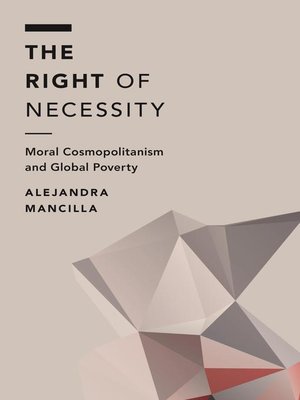The Right of Necessity
ebook ∣ Moral Cosmopolitanism and Global Poverty · Off the Fence: Morality, Politics and Society
By Alejandra Mancilla

Sign up to save your library
With an OverDrive account, you can save your favorite libraries for at-a-glance information about availability. Find out more about OverDrive accounts.
Find this title in Libby, the library reading app by OverDrive.



Search for a digital library with this title
Title found at these libraries:
| Library Name | Distance |
|---|---|
| Loading... |
Does recognition of the basic human right to subsistence imply that the needy are morally permitted to take and use other people's property to get out of their plight? Should we respect the exercise of this right of necessity in a variety of scenarios – from street pickpocketing and petty theft to illegal squatting and encamping?
In this concise and accessible book, Alejandra Mancilla addresses these complex and controversial moral questions. The book presents a historical account of the concept of the right of necessity—from the medieval writings of Christian canonists and theologians to seventeenth century natural law theory. The author then goes on to ground this right in a minimal conception of basic human rights, and proposes some necessary and jointly sufficient conditions for its exercise. She confronts the main objections that may be posed against this principle and ultimately concludes that the exercise of this right should be considered as a trigger to secure a minimum threshold of welfare provisions for everyone, everywhere.
In this concise and accessible book, Alejandra Mancilla addresses these complex and controversial moral questions. The book presents a historical account of the concept of the right of necessity—from the medieval writings of Christian canonists and theologians to seventeenth century natural law theory. The author then goes on to ground this right in a minimal conception of basic human rights, and proposes some necessary and jointly sufficient conditions for its exercise. She confronts the main objections that may be posed against this principle and ultimately concludes that the exercise of this right should be considered as a trigger to secure a minimum threshold of welfare provisions for everyone, everywhere.







